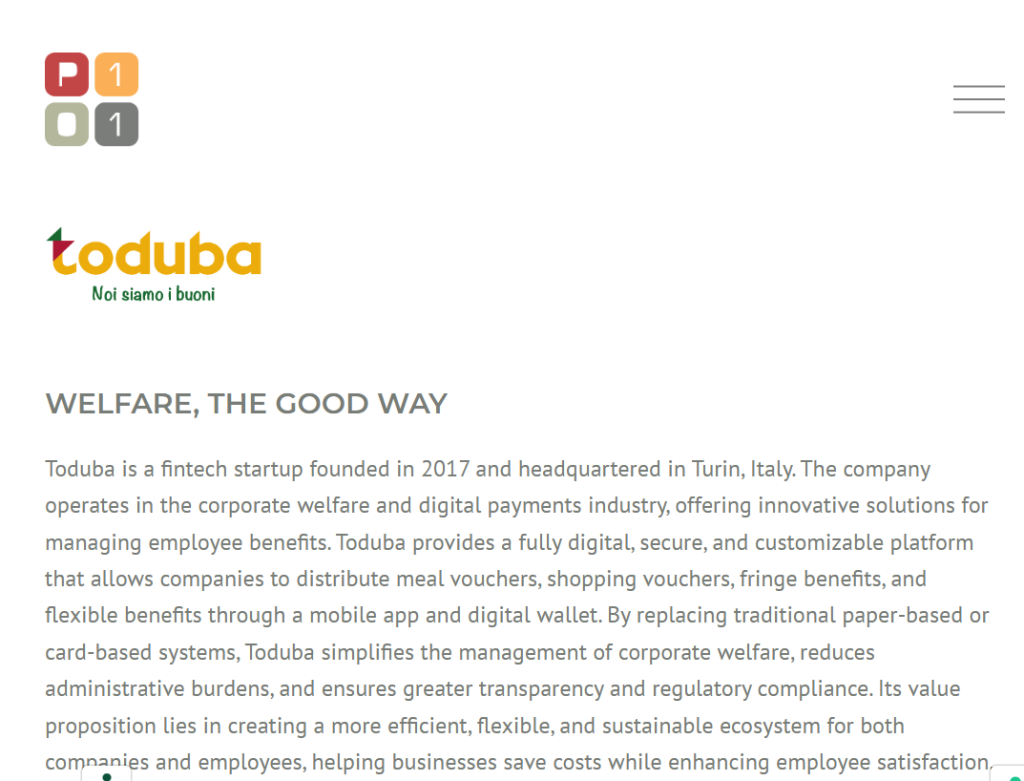
Toduba, the rising European travel-tech startup, has just announced a $4.09 million funding round led by P101, one of Italy’s top VC funds. The company, led by Gianluca Enrietti, is positioning itself at the intersection of real-time personalization, travel experience enhancement, and mobility data optimization - a fast-emerging niche within travel technology that’s becoming more relevant in a post-pandemic, AI-native world.
The funding will be used to expand Toduba’s product capabilities, scale its platform across Europe, and deepen integrations with mobility and hospitality ecosystems that are notoriously fragmented.
The New Battleground: Experience-as-a-Service in Travel Tech
Traditional travel technology has long focused on logistics - booking engines, search aggregation, and airline APIs. But what travelers demand in 2025 has shifted: seamless experiences, contextual personalization, and hyper-local recommendations, all delivered in real-time. In short, the industry is evolving from where to go to how to feel while getting there.
This is where Toduba’s mission becomes strategic. Rather than adding another layer of friction through endless options, their platform uses behavioral data, contextual inputs, and user intent to personalize the mobility and travel layer dynamically - from transport recommendations to experience curation to in-destination assistance.
According to Statista, the global smart tourism market is projected to exceed $68 billion by 2027, growing at 14.8% CAGR, with the most significant shifts happening in personalization, predictive travel AI, and seamless mobility. Toduba is betting on all three.
What Makes Toduba's Approach Different?
While most travel startups build around booking engines or narrow use cases, Toduba is focused on building a modular intelligence layer - one that can sit across a user’s journey regardless of the interface they started with (app, website, travel agency, or transportation provider). Their technology enables real-time decision support, making the travel experience more adaptive, predictive, and context-aware.
This means the platform doesn't just track where you're going - it understands why, when, and how to enhance it in ways that are both emotionally resonant and operationally efficient.
The market doesn’t need more aggregators. It needs experience enablers. That’s Toduba’s edge.
Founders: Don’t Just Sell a Product. Engineer a Strategic Ecosystem Early.
There’s a highly repeatable pattern hiding in this kind of raise - something that’s not about code or capital, but ecosystem architecture. Toduba likely didn’t raise $4M+ on an MVP alone. What most early-stage founders overlook is how powerful upstream integration partnerships are, not just as a growth hack, but as a funding unlock.
Investors don’t just back products - they back positioning within value chains. When you anchor your startup to systems already being adopted (like city mobility networks, public transportation data standards, or local tourism APIs), you reduce both your CAC and your credibility gap.
This is particularly true in travel and mobility tech, where consumer trust is fragile and margins are tight.
Here’s the move more founders should consider:
Before you build the final version of your product, map the adjacent data and distribution nodes that already touch your user’s journey. Then, form at least two high-leverage integration commitments - even if they’re pilot-only or non-exclusive. This proves that your product isn’t operating in a vacuum. It’s part of a larger shift.
Toduba, by focusing on real-time personalization across mobility infrastructure, positioned itself within a city-level and provider-level ecosystem. That signals scalability and defensibility to VCs. It’s a tactic founders in fintech, healthtech, and other platform-dependent verticals should use aggressively - especially pre-Series A.
Why Travel-Tech is Heating Up Again
The travel-tech landscape took a hit during COVID-19, but the rebound has been powerful. According to CB Insights, travel-tech funding surged past $8 billion globally in 2024, with a notable shift toward AI, hyper-personalization, and experience-centric platforms.
Consumer behavior has changed permanently. Travelers now expect:
- Personalized itineraries (powered by data, not generic guides)
- Frictionless mobility (integrated ticketing, smart routing, real-time alternatives)
- In-destination assistance (what to do next, not just how to get there)
This behavior is especially strong among Millennial and Gen Z travelers, who now make up over 60% of the travel spend in developed economies, per Booking.com insights. They prioritize local relevance, sustainability, and convenience - not five-star luxury.
Platforms like Toduba are optimized for this behavioral shift. Instead of building static booking flows, they’re enabling fluid experiences - contextual, evolving, and tuned to traveler intent.
What Toduba Plans to Do With the Capital
With over $4 million now secured, Toduba will be expanding its product team, enhancing its AI stack, and deepening partnerships with transportation hubs, municipalities, and travel service providers. The goal is to make its intelligence layer plug-and-play for any system that interfaces with travelers - apps, platforms, kiosks, or even concierge services.
There’s also likely a strong focus on data standardization and interoperability, enabling Toduba to scale across borders quickly. This could give it a competitive edge over more siloed travel-tech startups that rely heavily on local market dependencies.
Final Thought: Toduba's Raise Is About More Than Just Travel
While Toduba plays in the travel-tech space, its core innovation - real-time personalization layered across a fragmented ecosystem - has broader implications. It's a signal of how platforms in 2025 and beyond will need to behave: context-aware, infrastructure-integrated, and invisible until needed.
Founders should study this raise not just as a milestone, but as a playbook. Toduba didn’t just build a product. They designed relevance into the system architecture - and they did it early enough for investors to believe in scale before scale existed.









